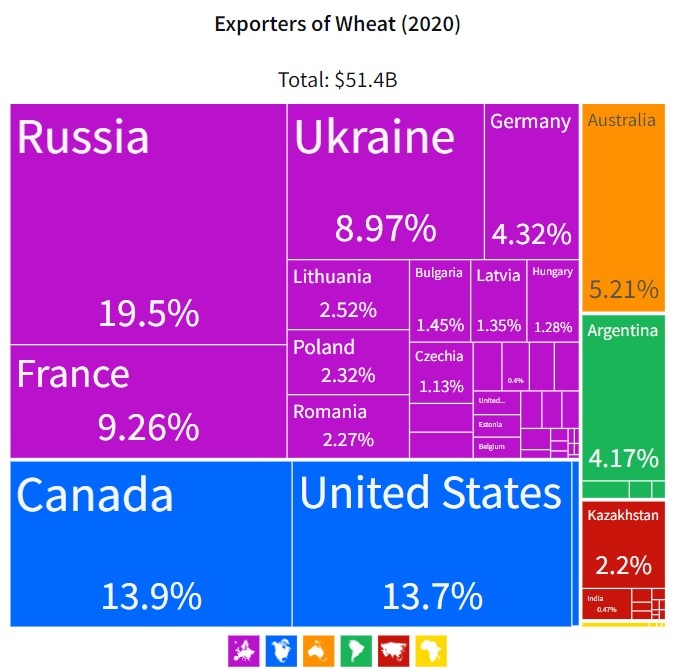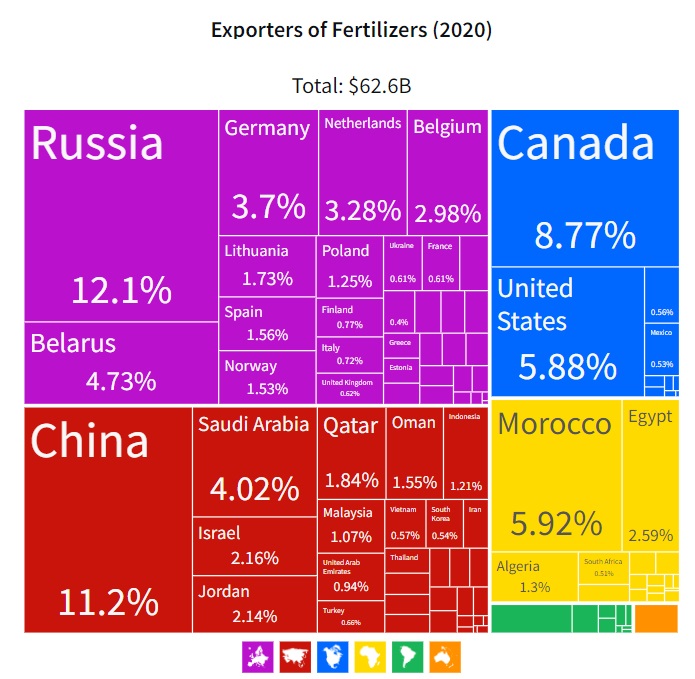
HOME ABOUT REPORTS CONTACT HELP WANTED
The world is already experiencing a global food crisis. The sanctions against Russia are only making it worse. If this keeps going, millions will die. (Politico, 8-15-22)
The head of the World Bank has stated that we are facing a threat of imminent human catastrophe (Asia Times, 5-26-22).
The head of the African Union has called for lifting some of the sanctions on Russia (Mronline, 6-15-22). He has warned that the situation is causing a threat to food security in Africa.
Oxfam International slammed the G7 for failing to respond to a global food crisis that has pushed as many as 323 million people worldwide to the brink of starvation. (Common Dreams, 6-28-22).
“I’ve been working in this sector now for more than 15 years and this for me is the worst crisis we've seen," said Carin Smaller, executive director of the Shamba Centre, a think tank working to end global hunger. Humanitarian agencies are scrambling to prepare themselves for even more critical levels of hunger, as they face a €14 billion annual gap in food security spending. What doesn't help is that a drought is currently gripping the horn of Africa, leaving some 26 million people facing food shortages. More than 7 million livestock animals have already been wiped out. Across East Africa as a whole, some 50 million people are facing acute food insecurity.(Politico, 8-15-22)
Senators of both U.S. political parties are growing frustrated over the Biden administration’s delay in delivering global food aid funding from the Ukraine aid bill Congress passed this spring. (Politico, 6-26-22)
It is also worth noting that most countries in the world do not support the West's sanctions on Russia (Anti-Russia Alliance Is Missing a Big Bloc: The Developing World - The Wall Street Journal, 4-14-22)
UN Secretary General António Guterres describes the present global food crisis. “There is really no true solution to the problem of global food security without bringing back the agriculture production of Ukraine and the food and fertilizer production of Russia and Belarus into world markets despite the war.”
More than 800 million people are currently suffering from chronic food insecurity. At least 107 economies are exposed to poverty and hunger. If the crisis in Ukraine continues, billions of people could be thrown into "poverty, destitution and hunger" on a scale not seen in decades according to the UN.
U.S. leadership is trying to blame Russia exclusively for the current food crisis. The leadership in the U.S. and other G7 nations have insisted that Russia is cutting off exports from Ukraine is leading to global food insecurity. This is true. However, much of the leadership in the West doesn't want to admit that a global food shortage is also being caused by sanctions against Russia (Asia Times, 5-26-22).
We're not opposed to all sanctions. Sometimes sanctions are necessary. And at Earth Future Action, we absolutely condemn the brutal actions of Russia in invading Ukraine. However, it is important to understand that sanctions have frequently led to war in history. Sanctions should be used sparingly. They are not the magic solution to everything. Sanctions are not harmless. Sanctions can kill more people than some wars.
America is also currently the world's largest debtor. In addition to exacerbating a global famine, American economic warfare against Russia could end up devastating the U.S. economy if it creates major shifts in world credit flows. After all, why trust America with your money if America will try to seize it any time it does not like your policies?
STATISTICS ON RUSSIAN AND UKRAINIAN EXPORTS


The sanctions against Russia are a study in Western hypocrisy. The Western countries continue to buy Russian oil and gas, but African countries are cut off from food and key agricultural supplies.
Russia plays a vital role in exporting agricultural products as well as precious metals. The sanctions on Russia threaten the supply of these commodities to the world economy.
Ukraine and Russia together supply about 30% of the world's wheat and barley, one-fifth of the world's maize, and over half of its sunflower oil according to a UN report.
In 2020, Russia was the world's #1 exporter of wheat and fertilizer. They exported nearly a fifth of all the world's wheat. Russia also exports 12% of the worlds' fertilizers. (OEC)
Between 2017-2020, they exported roughly 10 percent of the world's nickel (Statista).
Other key exports are semi-finished iron, non-fillet frozen fish, and pig iron.
In 2020, Ukraine was the world's biggest exporter of seed oils. As shown on the graphic above, they also export about 10% of the world's wheat.
PETITIONS
Coalition Denounces US Sanctions Harming People Worldwide (Common Dreams, 4-28-22) Read Letter Here
A coalition of two dozen organizations on Thursday urged President Joe Biden to overhaul U.S. policies regarding economic sanctions and blockades so that they no longer amount to "unjust collective punishment of civilian populations around the globe."
EARTH FUTURE ACTION ARTICLES ON SANCTIONS
The Geneva Convention and the Treatment of Civilians
U.S. Sanctions As a Violation of the Geneva Convention
EARTH FUTURE ACTION ARTICLES ON UKRAINE
We Support a Ceasefire in Ukraine - Open Letter to Biden
REPORTS
The Human Consequences of Economic Sanctions (Center For Economic and Policy Research, 2023)
This report provides a comprehensive survey and assessment of the literature on the effects of economic sanctions.
It goes over 32 studies.
NEWS ARTICLES
The Global Food Shortage
The world food crisis is about to get worse (Politico, 8-15-22)
Hunger In Africa: The Situation Is Serious (Zerohedge, 8-4-22)
Oxfam Condemns G7 for Leaving 'Millions to Starve' as Global Hunger Surges (Common Dreams, 6-28-22)
Oxfam International slammed the G7 for failing to respond anywhere near adequately to a global food crisis that has pushed as many as 323 million people worldwide to the brink of starvation.
Not-so-emergency aid: Billions in funding to avert mass hunger still waiting to be spent (Politico, 6-26-22)
Senators of both parties are growing frustrated over the Biden administration’s delay in delivering global food aid funding from the Ukraine aid bill Congress passed this spring.
US sanctions on Russia will lead to global food disaster (Asia Times, 5-26-22)
Even before the Ukraine war, more than 800 million people were already suffering from chronic food insecurity.
Now it's only going to get much worse. The leadership in the U.S. and other G7 nations have insisted that Russia cutting off exports from Ukraine is leading to global food insecurity.
This is true. However, they don't want to admit that a global food shortage is also being caused by Western sanctions against Russia (Asia Times, 5-26-22).
A fertilizer shortage, worsened by war in Ukraine, is driving up global food prices and scarcity (CNBC, 4-6-22)
UN Report on the Effect of Ukraine War on Global Food Supply (UN, 2022)
More News Links
Is the US chip ban on China a declaration of war in the computer age? (MSN, 10-30-22)
Africa Confronts the Food, Fertilizer, and Climate Crisis (Black Agenda Report, 11-9-22)
5 countries hit hard by the Russia-Ukraine grain crisis (The Washington Post, 6-15-22)
UN: War in Ukraine "supercharging" global crises (Axios, 4-14-2022) Read UN Report PDF
How sanctions impact Russia and the global economy (Deloitte)
The Economic Weapon: The Rise of Sanctions as a Tool of Modern War (Amazon Book)
Waltzing Toward Armageddon with the Merchants of Death (Chris Hedges, 3-14-22)
Inflation fears could limit the U.S. sanctions response to Russia’s Ukraine invasion (The New York Times, 2-24-22)
U.S. Sanctions Aimed at Russia Could Take a Wide Toll (New York Times, 1-29-22)
US sanctions on Russia affect defence, tech, finance (Aljazeera, 2-24-22)